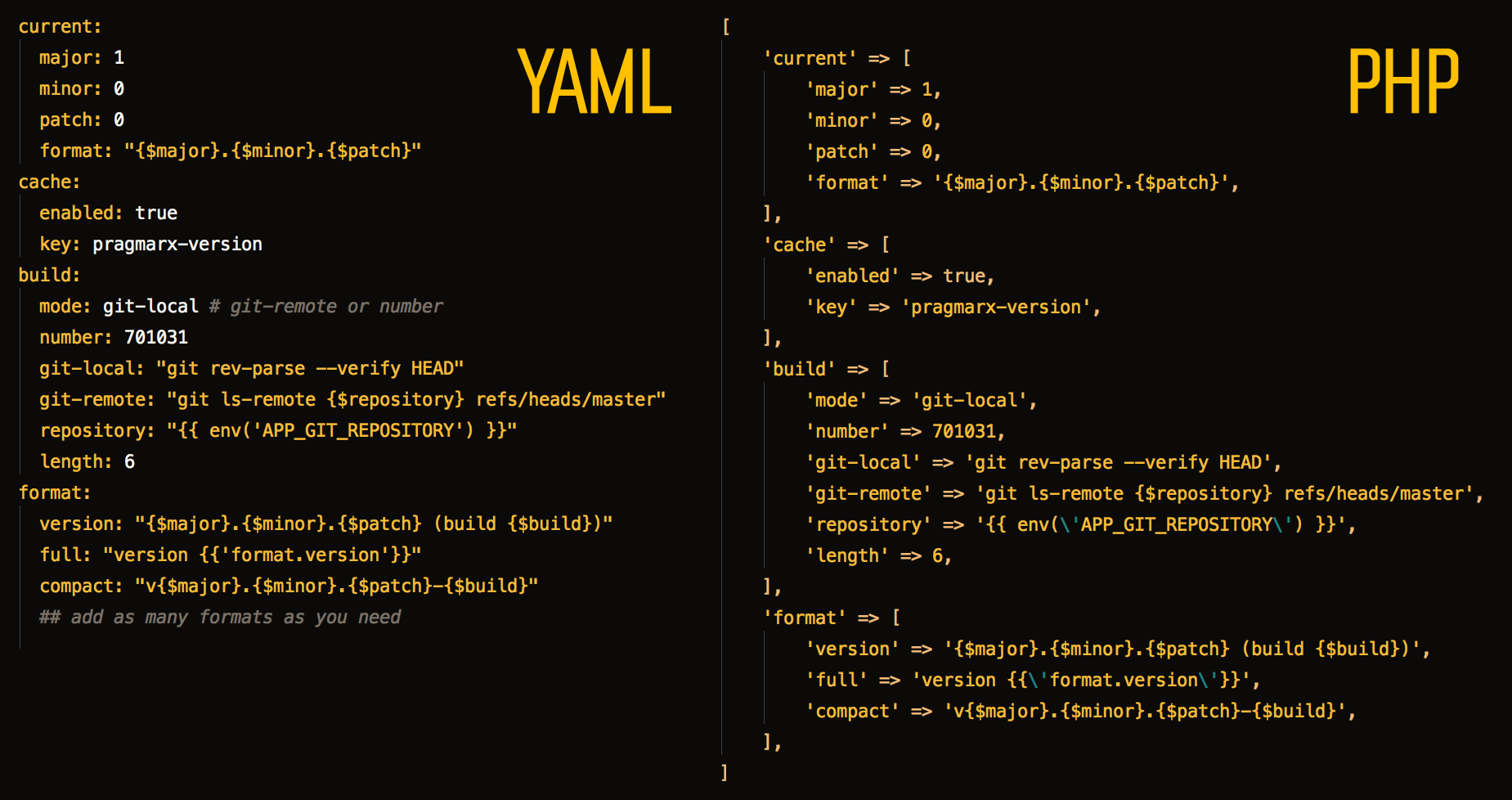pragmarx / yaml
Load your Laravel config files using yaml
Requires
- php: >=7.0
- illuminate/support: >=5.5.33
- symfony/yaml: ^3.4|^4.0|^5.0|^6.0|^7.0
Requires (Dev)
- orchestra/testbench: 3.5|^3.6|^4.0|^5.0|^6.0
- phpunit/phpunit: ^4.0|^6.4|^7.0|^8.0|^9.0
Suggests
- ext-yaml: Required to use the PECL YAML.
README
A Laravel YAML parser and config loader
Rationale
Config files getting bigger, harder to maintain and look at, every day. Why not just use YAML to load them?
Which one is cleaner?
Key features
Load one file to Laravel config
Yaml::loadToConfig(config_path('myapp.yml'), 'my-app-conf');
Or a whole directory, recursively, so all those files would be loaded with a single command
Yaml::loadToConfig(config_path('myapp'), 'my-app-conf');
To load a directory with all your config files:
.
└── myapp
├── multiple
│ ├── alter.yml
│ ├── app.yml
│ └── second-level
│ └── third-level
│ ├── alter.yml
│ └── app.yml
├── single
└── single-app.yml
Then you would just have to use it like you usually do in Laravel
config('my-app-conf.multiple.second-level.third-level.alter.person.name')
Execute functions, like in the usual Laravel PHP array config.
repository: "{{ env('APP_NAME') }}" path: "{{ storage_path('app') }}"
Config values can reference config keys, you just have to quote it this way:
{{'format.version'}}
You can add comments to your YAML files, something JSON wouldn't let you do
build: mode: git-local #### other modes: git-remote or number
Parser and dumper methods
In case you need to deal with YAML directly, you can use these public methods:
Yaml::parse($input, $flags) // Parses YAML into a PHP value. Yaml::parseFile($filename, $flags) // Parses a YAML file into a PHP value. Yaml::dump($input, $inline, $indent, $flags) // Dumps a PHP value to a YAML string.
Which are simple bridges to Symfony's YAML.
Install
Via Composer
$ composer require pragmarx/yaml
Using
Publish your package as you would usually do:
$this->publishes([ __DIR__.'/../config/version.yml' => $this->getConfigFile(), ]);
Load the configuration in your boot() method:
$this->app ->make('pragmarx.yaml') ->loadToConfig($this->getConfigFile(), 'my-package');
Or use the Facade:
Yaml::loadToConfig(config_path('myapp.yml'), 'my-package');
And it's merged to your Laravel config:
config('my-package.name');
Utilize PECL YAML
To utilize the PECL YAML, you should install the PECL YAML extension and register the binding in the register() method of your service provider:
$this->app->bind(\PragmaRX\Yaml\Package\Support\Parser::class, \PragmaRX\Yaml\Package\Support\PeclParser::class);
Example
This is a YAML file from another package using this package:
current: major: 1 minor: 0 patch: 0 format: "{$major}.{$minor}.{$patch}" cache: enabled: true key: pragmarx-version build: mode: git-local # git-remote or number number: 701031 git-local: "git rev-parse --verify HEAD" git-remote: "git ls-remote {$repository} refs/heads/master" repository: "{{ env('APP_GIT_REPOSITORY') }}" length: 6 format: version: "{$major}.{$minor}.{$patch} (build {$build})" full: "version {{'format.version'}}" compact: "v{$major}.{$minor}.{$patch}-{$build}" ## add as many formats as you need
Minimum requirements
- Laravel 5.5
- PHP 7.0
Author
License
This package is licensed under the MIT License - see the LICENSE file for details
Contributing
Pull requests and issues are welcome.

